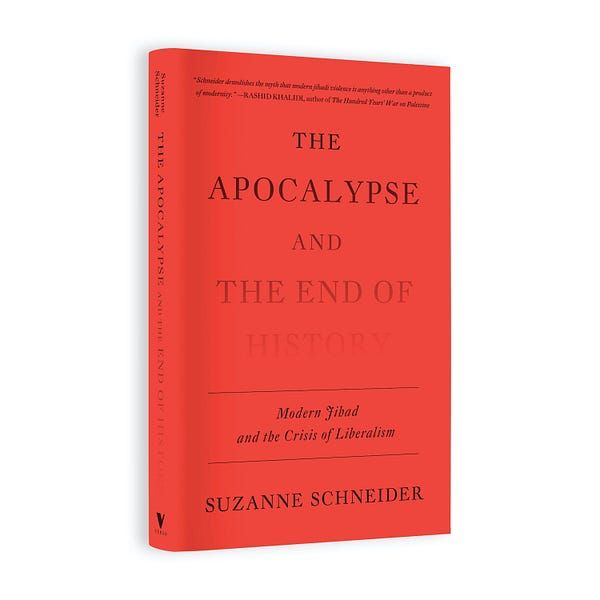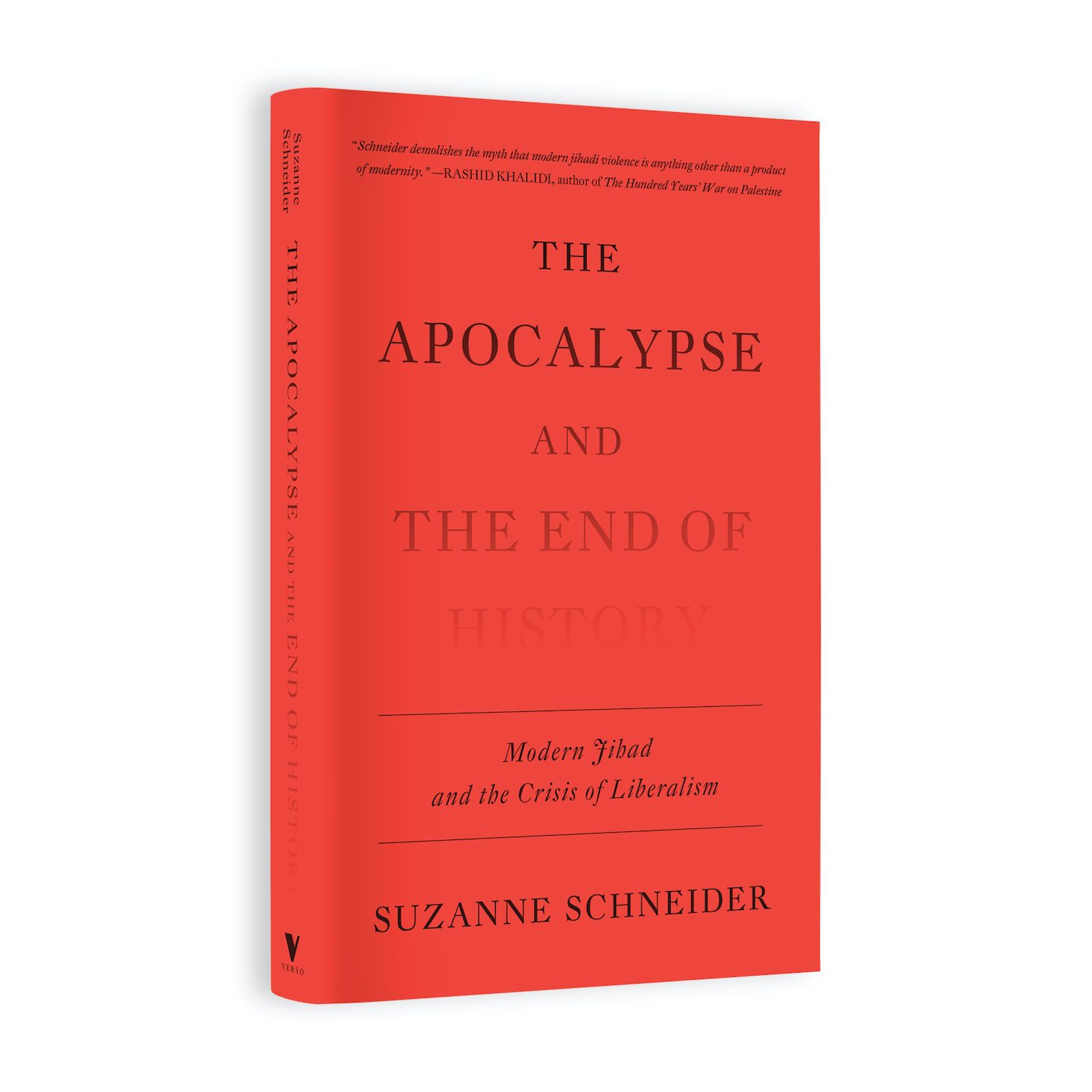Nihilistic Feelings Are Moving
If I try reading The Apocalypse and The End of History by Suzanne Schneider, I see right through them.


Edited by Sam Thielman
Buy REIGN OF TERROR: How The 9/11 Era Destabilized America and Produced Trump
Wednesday’s edition was about books, and I expected it to be the only one I produced this week. But then I finished The Apocalypse and The End of History: Modern Jihad and The Crisis of Liberalism by Suzanne Schneider, and it energized me.
This is another one, like my friend Sam Goldman’s, that packs a ton into a very compact volume. Schneider, the deputy director of the Brooklyn Institute for Social Research, presents the so-called Islamic State not as the revival of an ancient phenomenon, but as a painfully modern one, even one with conspicuous similarities to contemporary western reactionaries. She cuts through a facile interpretive binary: ISIS is not either seeking to apply what it understands as a purified Islam or nihilistic: the way it manifests that quest for purity is inescapably nihilistic.
Modernity’s destabilization of traditional authority and exaltation of the individual has produced a new mode of jihad, Schneider contends. No more does a believer have to grapple with an infinitely complex central text and an esoteric interpretative tradition to approach religious understandings. Now all that’s necessary is to read the Qu’ran and listen when a charlatan tells you that nothing exists outside that text. Your interpretation—that is, their interpretation, but you’re not meant to notice that part—is as valid as someone who has spent a lifetime studying its contradictions, elisions and interpretive history.
Neoliberalism’s post-1989 message of irrevocable historical triumph, presaged by Margaret Thatcher’s ominous “there is no alternative” slogan, is the context from which ISIS emerges, Schneider writes. ISIS internalized that western besiegement—military, economic, spiritual—was inevitable and likely insurmountable. Their triumph could simply be defiance. In that context (and of course alongside losing the Caliphate), ISIS decided that jihad was its own point and the Caliphate exists wherever you say it exists. Suddenly, and ironically for an entity that ruled over six million people, victory had no material definition. Struggle now operates for them as a marker of individual identity—Hot Topic jihad—rather than a stage in a political program.
When the sadboys of history destroy the basis of social legitimacy, and particularly when they do so in the name of religion, they run into the old problem of what to do with everybody else. What to do with Muslims who recognize how ugly, weird, and dehydrated they are? We know how ISIS responds to the problem: They kill and subjugate, and then hunt for Quranic passages to justify it. They read the Qu’ran exactly as the post-9/11 Islamophobia industry does. As someone whom that industry has targeted, I really enjoyed Schneider’s patient exploration of this point.
It’s important to point out, as Schneider does, that this is not what al-Qaeda was about—however easy it is to see that al-Qaeda opened the door for it. “Perhaps reflecting the class status of its key leaders, bin Laden and al-Zawahiri, al-Qaeda regarded itself as an elite vanguard rather than a vehicle for indulging popular superstitions,” she writes. You can see this play out in REIGN OF TERROR, particularly in the section of chapter 7 about ISIS’s war on al-Qaeda. I once asked someone who spent his youth fighting for al-Qaeda about the difference between them and ISIS. His reaction boiled down to: We were educated people, we had money—I can’t let this point go: bin Laden was a billionaire doing an extreme form of what billionaires always do, which is to toy with others’ lives—and attacks like 9/11 were products of a specific plan to free ourselves from Western political, economic, security, and cultural domination. ISIS are just thugs, criminals, and psychos.
Schneider brings out both the profound and the absurd here. She delves into something I wince to recognize my own book deals with only superficially: how the pathway to sanctifying violence for the individual-religious-authority runs through gender. ISIS is telling young men that such violence is their crucible for manhood, and they had better not miss their chance to be men. How sad and western is that? She quotes a bit of ISIS propaganda about the virgin who passes up Islamic Chadhood:
“[H]e willingly accept[s] his tragic condition of being a hypocritical spectator. He lives in the West among the kuffar [infidels] for years, spends hours on the Internet, reads news and posts on forums.”
Don’t go through life being an edgelord. Or, as Schneider writes:
Whatever one might think of the leftists of old, the fact that they were deeply committed to imagining and creating alternatives to capitalism can hardly be disputed. The more compelling explanation is not that contemporary jihad is the heir to the radical leftist tradition, but a symptom of its decline. If we are truly living—in Dame Thatcher’s immortal words—in a world in which there is no alternative, nihilism is exactly the form of anti-politics one would expect to find in this age of civic exhaustion. Here the apocalypse and the end of history [she means Fukuyama’s thesis] stand shoulder to shoulder, not as identical formations, but rather as different manifestations of a shared sense of futility.
If I’ve got a minor criticism of The Apocalypse and The End of History, it’s this. The ISIS fighters Schneider focuses on are the westerners who made pilgrimage to the Islamic State, not people who bandwagoned with ISIS after living through the Iraq occupation, the Syrian civil war, the War on Terror and so forth. Those people, for whom direct material conditions often compelled them to violence, are also part of the ISIS story. Her framework of neoliberal devastation, it seems to me, applies to them as well.
Happily, I’ll have a chance to ask her about this. On Monday night, you can watch Asad Dandia, Schneider and me talk about all this and more. We’ll be having a very unstructured conversation hosted virtually by the Brooklyn Public Library—which for me as a homegrown Brooklyn product is personally fulfilling—from 7 to 8:30 p.m. You can register for that here. I’m excited for this and I hope you’ll check it out. I’ve declined to go into the specific parallels Schneider draws between ISIS and American nihistic sadboys because she’s going to start off there!

